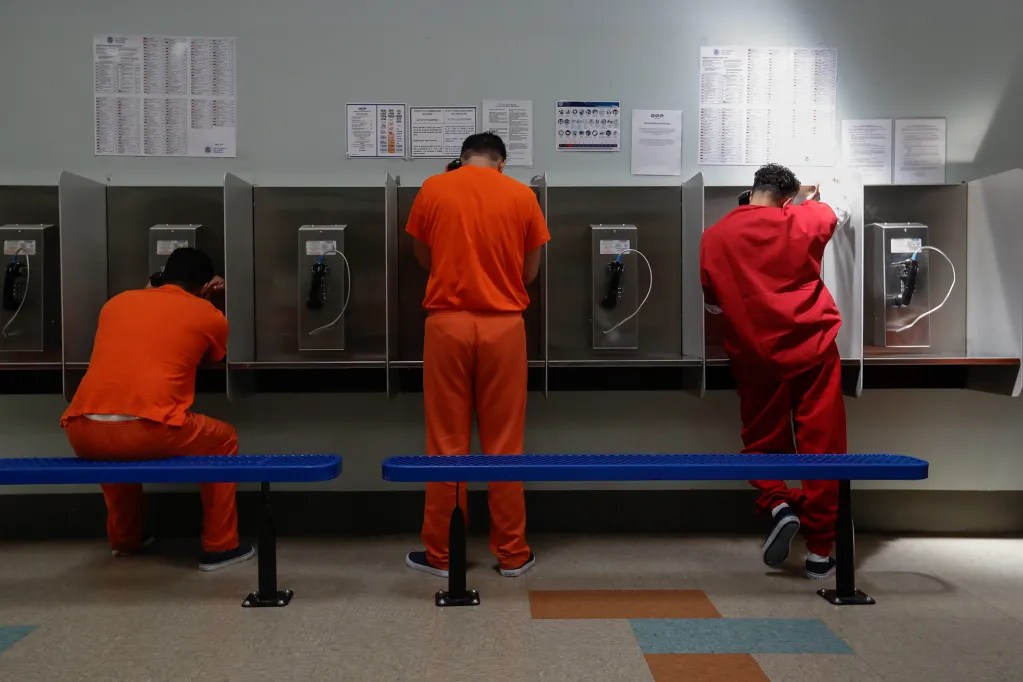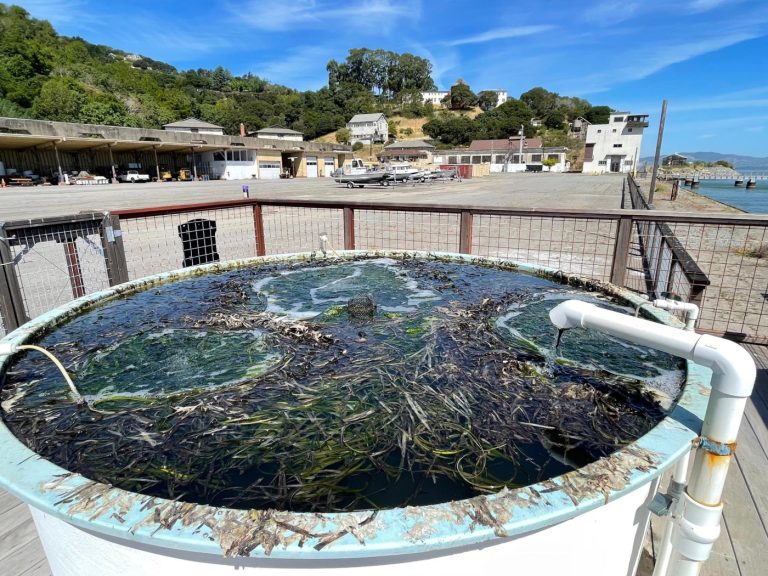BY WENDY FRY | CalMatters
A tough-on-crime ballot measure that appears destined to pass could lead to more Californians being deported, immigrant advocates warn.
Proposition 36 would reclassify certain misdemeanor drug and theft offenses as felonies, which means immigrants convicted of those crimes are more likely to face deportation if they have a case before an immigration court, the advocates said.
“It is not an understatement to say that if Prop. 36 passes, more Californians, including green-card holders, including refugees, will be deported,” said Grisel Ruiz, a supervising attorney with the Immigrant Legal Resource Center. “The impacts will be pretty disastrous.”
In California, where almost half of all children have at least one parent who is an immigrant, advocates are worried the measure could have ripple effects for families and communities. The initiative on the Nov. 5 ballot would allow prosecutors to impose stricter and longer sentences by using prior convictions as sentence enhancements.
Under this new system, a simple drug possession charge with prior convictions could be considered an “aggravated felony” conviction in immigration court, which triggers the most severe penalties possible. In almost all cases, a person in immigration court with an “aggravated felony” on their record faces mandated deportation for life and loses all chances of immigration relief, Ruiz said.
RELATED: 6 myths about California crime as voters weigh ballot measure on drugs, retail theft
Yolo County District Attorney Jeff Reisig, a Prop. 36 supporter, said the measure does not enhance the risks for immigrants any more than a retail and property crime package of bills the Legislature recently passed and the governor signed.
“The immigration argument to me is just a red herring because DAs already have a proven track record of working to mitigate unreasonable immigration consequences,” Reisig said.
The package of retail crime bills turns certain thefts into felonies but does not address drug offenses.
In general, supporters of Prop. 36 have described as overblown concerns that the measure would inflict devastating consequences for minor offenses. The measure mainly targets adult repeat offenders, they say. The state’s nonpartisan Legislative Analyst’s Office predicts the initiative would increase California’s prison population of 90,000 inmates by a few thousand.
Immigration courts may consider “dismissed” felonies
The goal of Prop. 36’s harsher sentences is to reduce drug-related crimes by steering repeat offenders toward treatment rather than prison; after finishing treatment, defendants can have their charges dismissed.
But federal immigration courts do not typically recognize dismissals that follow the successful completion of such diversion programs, Ruiz said.
Reisig disputed this, saying treatment means a “conviction is completely expunged” and that there is “zero risk of an immigration consequence.”
Devin Chatterton, the directing attorney at Immigrant Defenders Law Center, said people are often confused and unaware that any post-conviction relief received in state criminal court is not recognized in immigration court.
“Even if the criminal judge exercises some lenience or exercises some discretion, that discretion is not carried into the immigration proceedings,” she said. “That is all well and good for criminal court. But the immigration courts do not recognize a whole host of rehabilitative and relief-based things such as dismissal in state court.”
Chatterton said the results have devastating impacts on people, families and the community: “This is a way families become separated. People lose their parents. People lose their brothers or sisters, their moms, their dads. It’s really heartbreaking.”
Some immigrants told CalMatters they are concerned about the ramifications of Prop. 36.
“It’s scary,” said Jessica Sanchez, 29, whose mother brought her to the United States without federal authorization when she was a baby. Her family was fleeing violence-stricken Michocán, Mexico. Sanchez has been incarcerated in the past. She now works at Homeboy Industries, a Los Angeles-based nonprofit focused on gang rehabilitation and re-entry.
Though she wouldn’t be facing deportation for past convictions under Prop. 36, Sanchez said it’s troubling to see the progress California has made protecting immigrant communities potentially undone.
“To see that in one vote, in one year, everything can get taken back ten years — it’s scary because how long it took us to get here,” she said. “It’s scary because people lose hope.”
Strong support from voters
Related Articles
Fact-checking the ads for Proposition 33, California’s rent control ballot measure
PRO/CON: Should California raise the minimum wage with Proposition 32?
Opinion: Many workers can’t ask for more pay. Let voters speak for them
Opinion: Raising minimum wage won’t make California any more affordable
Proposition 3: Californians will decide whether to enshrine marriage equality in the state constitution
Officially titled the Homelessness, Drug Addiction and Theft Reduction Act, Prop. 36 has strong voter support despite opposition from California Gov. Gavin Newsom, polls indicate.
Earlier this month, UC Berkeley’s Institute of Governmental Studies found that 60% of likely voters support Prop. 36, with most backers citing as their reason the measure’s harsher punishments for repeat offenders. A new poll by the Bay Area News Group and Joint Venture Silicon Valley of more than 1,650 registered voters in the traditionally left-leaning Bay Area found 70% of respondents supported Proposition 36 while 20% were opposed.
Also supporting the measure are the Democratic mayors of San Francisco, San Jose, and San Diego. California’s Legislative Analyst’s Office estimated it could cost the state ”several tens of millions of dollars to the low hundreds of millions of dollars annually” plus tens of millions of dollars at the local level.
Supporters of Prop. 36 say the measure will rectify some of the shortcomings of an earlier ballot initiative, Proposition 47. Approved by voters ten years ago, Prop. 47 sought to reduce California’s severe prison overcrowding by reclassifying as misdemeanors six felony theft and drug crimes, including shoplifting and simple drug possession. It funneled the resulting cost savings into drug and mental health treatment and services for victims of crime and at-risk students. Since then, participation fell sharply in California’s optional drug courts, which offer treatment as an alternative to a conviction. Meanwhile, prosecutors, police, and big box retailers like Walmart and Target blamed the law for an increase in property crimes and homelessness.
But Prop. 36 can produce life-altering consequences for anyone who is not a U.S. citizen, including long-time permanent residents, green card holders and DACA recipients, even over normally minor crimes.
Currently in California, theft of items worth $950 or less is generally a misdemeanor. Prop. 36 would make this crime a felony for people who have two or more past convictions for certain related crimes like shoplifting, burglary, or carjacking. The sentence, beyond any fallout in immigration court, would be up to three years in county jail or state prison.
In California, where one in every four people is foreign-born, immigrants face far greater rates of poverty and lack full access to social programs. The poverty rate for foreign-born Californians was 17.6%, compared to 11.5% for U.S.-born residents; poverty among undocumented immigrants was 29.6%. Additionally, 41% of undocumented children and young adults between the ages of 0 and 26 in California are living in poverty, according to Nourish California, an organization that fights hunger.
Sanchez said the state should address that poverty rather than trying to crack down on the issue through the criminal justice system.
“I’m not saying stealing is the right way to do things, but what would you do if you were hungry? “ Sanchez said. “Or if you had children at home who were hungry?”












